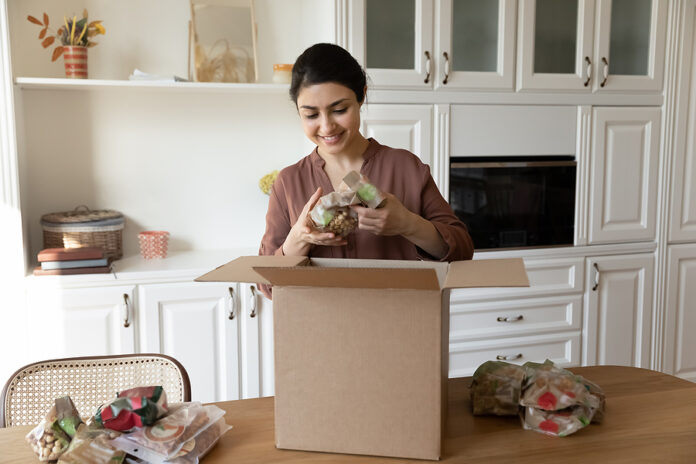
By Amy Packer, Director of Sales Operations for United Hughes, a BradyPLUS company
During a time when an increasing number of products, previously purchased within brick-and-mortar retail stores, are landing on our doorsteps, the need for sustainable packaging and practices becomes critical. Some of the key contributors to environmental degradation in food shipping are excessive and non-biodegradable packaging and inefficient shipping practices. Developing strategies and practices to better utilize sustainable packaging in the food industry will help reduce waste, minimize environmental harm, and encourage a more environmentally responsible approach.
Materials matter
An important step in enhancing sustainable packaging in food shipping is the selection of materials used in the packaging process. Using products that are biodegradable or compostable is just the beginning. Reducing the environmental footprint can be done in many ways with many different measurable outcomes. Opting to eliminate single-use plastics is an example of impactful changes to packaging. Using corrugated with higher contents or recycled materials is another. There is no shortage of types of materials that could be selected to help enhance your sustainability practices. Materials such as plant-based packaging, curbside recyclable, biodegradable, compostable, bioplastics, and FSC (Forest Stewardship Council) Certified packaging are just some of the options available.
Size matters
While evaluating your food packaging, size matters as well. Often, and especially with temperature-sensitive products, food packaging can become oversized and complex, which contributes to excess waste and increased transportation costs and carbon emissions. Right-sizing packaging to fit the contents tightly will help to reduce the amount of packaging material used but also the costs and impacts of transportation. Taking advantage of a more minimalist design also communicates a commitment to eco-friendly packaging to the end user.
Process matters
In a holistic look at packaging, the process is an integral part of creating an efficient and standardized product. By introducing automation into your packaging process, you can not only increase productivity but reduce waste and damage. Using technology such as carton erectors, case sealers, stretch wrappers, and case labelers will dramatically increase your efficiency and effectiveness. Utilizing automation can accomplish many measurable KPIs. Creating a standard and automating the process will help reduce the amount of materials consumed as well as reduce damage and any need to return or re-ship products.
Returns matter
The number of products now shipped to the home is increasing, and so are the return rates. With every returned order comes waste. Re-shipped items create more packaging, more waste, more time utilized, more fuel burned, and an overall higher impact on the environment. Evaluating what protective packaging is required to ship the products once and damage-free is critical to your sustainable approach. There are many variations of sustainable dunnage and temperature control products that do not sacrifice protection. Work with packaging consultants to understand how to best configure your over-packaging approach that delivers a sustainable result without affecting the protection of the product.
Perception matters
Each year, the percentage of consumers who report the willingness to pay higher prices for more sustainably packed products increases. Having an environmentally friendly approach to the increasing amount of packaging that is now ending up in the waste stream will become more and more important to the end-user of your products. Tackling this approach may seem overwhelming due to the large variations in approaches that can be used. Turn to the experts to help guide and recommend what changes can be the most beneficial to you and your consumers.
 Amy Packer is a seasoned professional with 25 years of experience in the packaging industry and currently serves as the Director of Sales Operations for United Hughes, a BradyPLUS company. Throughout her career, Amy has held various key positions within United Hughes, including Customer Service Manager, Equipment Project Manager, and Marketing Manager, among others, providing her with a comprehensive understanding of both the internal infrastructure of packaging distribution and outside sales strategies. Recognized for her exceptional contributions, Amy has been honored with the Champion of the Year Award in 2016, 2020, 2022, and 2023, as well as the President’s Award in 2020, by the Packaging Distributors of America (PDA) of which she is a long-time member and currently serves as co-chairwoman of the PDA Member Council. Amy’s dedication and expertise have played a crucial role in driving the company’s success and fostering companywide advancements.
Amy Packer is a seasoned professional with 25 years of experience in the packaging industry and currently serves as the Director of Sales Operations for United Hughes, a BradyPLUS company. Throughout her career, Amy has held various key positions within United Hughes, including Customer Service Manager, Equipment Project Manager, and Marketing Manager, among others, providing her with a comprehensive understanding of both the internal infrastructure of packaging distribution and outside sales strategies. Recognized for her exceptional contributions, Amy has been honored with the Champion of the Year Award in 2016, 2020, 2022, and 2023, as well as the President’s Award in 2020, by the Packaging Distributors of America (PDA) of which she is a long-time member and currently serves as co-chairwoman of the PDA Member Council. Amy’s dedication and expertise have played a crucial role in driving the company’s success and fostering companywide advancements.







